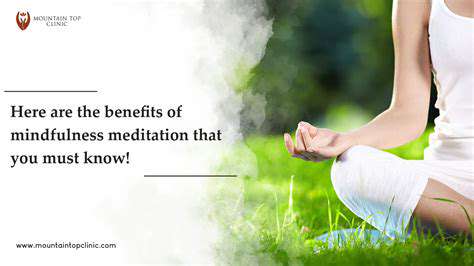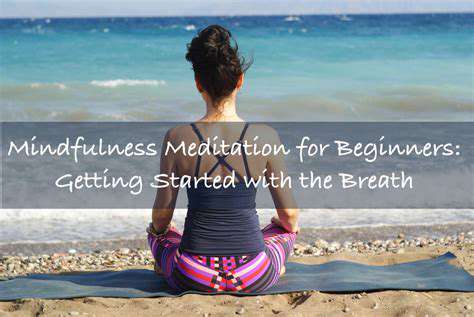Mindfulness Meditation: Cultivating a Practice for Enhanced Well Being
Dec 01, 2024 / zsfcdn103/
The Core Principles of Mindfulness Meditation
The Importance of Awareness
Awareness is the cornerstone of mindfulness meditation. It involves tuning into the present moment and acknowledging your thoughts, emotions, and bodily sensations without judgment. By cultivating awareness, practitioners can develop a deeper understanding of their mental processes and emotional triggers. This enhanced awareness allows individuals to respond to situations more thoughtfully rather than reacting impulsively.
Practicing awareness can lead to reduced anxiety and improved emotional regulation. When we learn to observe our thoughts without becoming entangled in them, we can break free from negative thought patterns. This creates space for more positive and constructive thinking, ultimately fostering a sense of well-being and resilience in daily life.
Developing a Consistent Practice
Consistency is key in establishing a successful mindfulness meditation practice. Setting aside dedicated time each day for meditation can help reinforce the habit, making it a natural part of your routine. Whether it's just a few minutes in the morning or a longer session in the evening, the important thing is to find a schedule that works for you and stick to it.
A variety of techniques can be employed to keep your practice engaging, from guided meditations and body scans to loving-kindness exercises. Experimenting with different approaches can help you discover what resonates most with you, leading to a deeper and more fulfilling meditation experience. Remember, the goal is not to achieve perfection but to develop a lifelong habit that nurtures your mental and emotional health.
Benefits of Practicing Mindfulness Meditation

Improved Mental Clarity
One of the most significant benefits of practicing mindfulness meditation is the enhancement of mental clarity. When individuals engage in mindfulness, they learn to focus their thoughts and become more aware of their mental processes.
This practice can lead to sharper decision-making and improved problem-solving skills. By consistently practicing mindfulness, individuals often find that their minds are less cluttered, allowing for greater creativity and innovative thinking.
Enhanced Emotional Resilience
Mindfulness meditation also aids in developing emotional resilience. It encourages individuals to observe their emotions without judgment, which can lead to healthier responses to stress.
With regular practice, individuals often become more adept at handling negative feelings and better equipped to bounce back from challenging situations. This increased emotional regulation can significantly contribute to overall mental health and well-being.
Getting Started with Mindfulness Meditation

Understanding the Basics of Mindfulness
Mindfulness is the practice of being fully present and engaged in the moment, without judgment. It involves observing your thoughts, feelings, and sensations as they arise. Recognizing that thoughts are just thoughts and not necessarily reality is a key aspect of this practice. This can lead to greater emotional regulation and a higher sense of self-awareness.
To cultivate mindfulness, it’s important to establish a regular practice. Start with just a few minutes each day and gradually increase the duration as you become more comfortable. Creating a designated space for meditation can also help signal to your mind that it’s time to engage in mindfulness.
Many people find it helpful to focus on their breath as a point of reference. This can ground you in the present moment and serve as an anchor when your mind begins to wander. Whenever you notice your thoughts drifting, gently guide your focus back to your breath.
Mindfulness can be practiced anywhere, not just during formal meditation sessions. You can incorporate it into daily activities like eating, walking, or even washing dishes. The goal is to bring awareness to what you are doing at each moment.
Ultimately, mindfulness is about embracing the here and now, fostering a sense of calm and clarity that can lead to enhanced well-being.
Setting Up a Meditation Routine
Establishing a consistent meditation routine is essential for developing mindfulness. Choose a time of day that works best for you—some prefer mornings, while others may find evening sessions more effective. Whatever time you choose, try to stick with it to create a habit.
Find a comfortable and quiet space where you can meditate without interruptions. This space can be enhanced by adding elements that promote relaxation, such as candles or soft cushions. Create an environment that makes you feel calm and at ease.
As you begin your practice, consider starting with guided meditations. Numerous apps and online resources offer guided sessions geared towards beginners. This can help you understand techniques and better focus your mind.
As you become more experienced, you might explore different types of meditation, such as loving-kindness or body scan meditations. This variety can keep your practice fresh and engaging, helping you discover what resonates best with you.
Remember, consistency is key. Even short, daily practices can lead to significant improvements in your overall sense of well-being and mindfulness.
Overcoming Common Challenges
Starting a mindfulness practice can come with its own set of challenges. Many beginners struggle with a wandering mind, which is completely normal. The key is to remain patient with yourself. It's important to recognize that mindfulness is a skill that takes time to develop.
Some may encounter discomfort during meditation, such as physical restlessness or emotional upheaval. It's essential to allow these sensations to pass without judgment. Acknowledging them can actually deepen your practice and build resilience.
If distractions in your environment disrupt your focus, try using earplugs or playing soft background music to create a more conducive atmosphere. Alternatively, practicing mindfulness in nature can offer a refreshing experience free from daily distractions.
In moments of frustration or discouragement, remind yourself of the benefits you're working towards. Reaffirming your intention to cultivate mindfulness can help keep you motivated to continue your journey.
Lastly, remember that there is no "right" way to meditate—what matters is finding what feels authentic to you. Embrace your unique process, and over time, you will see the benefits unfold.
Integrating Mindfulness into Everyday Life

Understanding the Nature of Mindfulness
Mindfulness is the practice of being present and fully engaging with the current moment. This involves paying attention to one's thoughts, feelings, and surroundings without any judgment. Developing mindfulness enhances self-awareness and helps in recognizing patterns of behavior. It encourages individuals to approach situations with curiosity rather than reactivity.
Integrating mindfulness into daily life requires intention and dedication. It is not merely a technique but a way of living that promotes peace and acceptance. Regular practice enables people to manage stress and anxiety more effectively.
Mindfulness teaches individuals to observe their thoughts and feelings as temporary experiences. This view can lead to greater emotional resilience. Ultimately, understanding the nature of mindfulness sets the foundation for deeper personal transformation.
The importance of mindfulness cannot be overstated; it serves as a tool for mental clarity and emotional balance. By embracing this practice, individuals can create a more harmonious relationship with themselves and their environment.
Mindfulness is not just limited to meditation sessions. Instead, it can be incorporated into mundane tasks, turning everyday activities into opportunities for reflection and awareness.
Practical Strategies for Implementing Mindfulness
Implementing mindfulness into everyday life can start with small, manageable steps. Simple practices such as mindful breathing can be performed at any moment throughout the day. This technique involves focusing on one's breath to anchor thoughts and emotions.
Another effective strategy is to practice mindful eating. This encourages individuals to focus on the experience of eating: the flavors, textures, and even the emotions associated with food. By doing this, people can develop a healthier relationship with what they consume.
Mindful walking is also a beneficial practice. It involves walking slowly and paying attention to each step, the movement of the body, and the environment. This not only enhances awareness but can also serve as a form of moving meditation.
Creating a designated mindfulness space in one’s home can promote the consistency of practice. This space should be quiet and comfortable, inviting relaxation and focus for meditation or reflection.
Engaging in mindfulness activities with others can foster a sense of community. This can include group meditations, yoga sessions, or simply sharing experiences of mindfulness with friends and family.
Overcoming Challenges in Mindfulness Practice
Despite the benefits, many individuals encounter challenges when trying to maintain a mindfulness practice. One common hurdle is the difficulty of quieting the mind. It is essential to acknowledge that this is a normal aspect of the journey.
Another challenge is finding time in a busy schedule to practice mindfulness. Incorporating short moments of mindfulness throughout the day—such as during a coffee break—can mitigate this issue.
Distractions from technology can disrupt mindfulness efforts. Setting boundaries around phone use and social media can help individuals focus more on present experiences. By consciously reducing distractions, one can create a more conducive environment for mindfulness practice.
It’s also common to feel frustration or judgment when thoughts wander during mindfulness sessions. Practicing self-compassion during these moments is crucial. Understanding that wandering thoughts are part of the process allows for a gentler approach to mindfulness.
Lastly, it’s important to remember that mindfulness is a journey, not a destination. Consistency and patience will yield deeper insights and benefits over time, making the practice more rewarding.